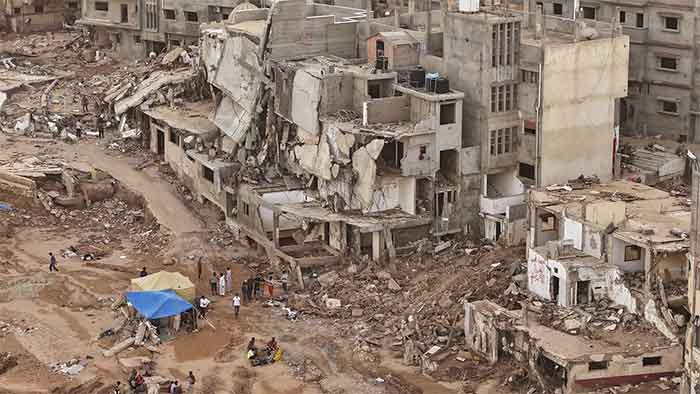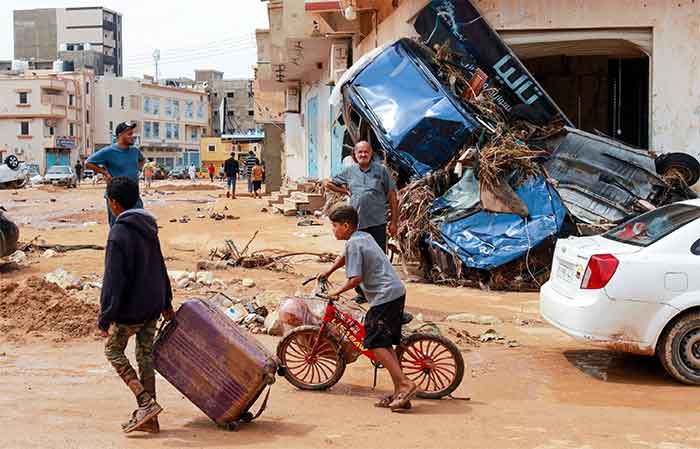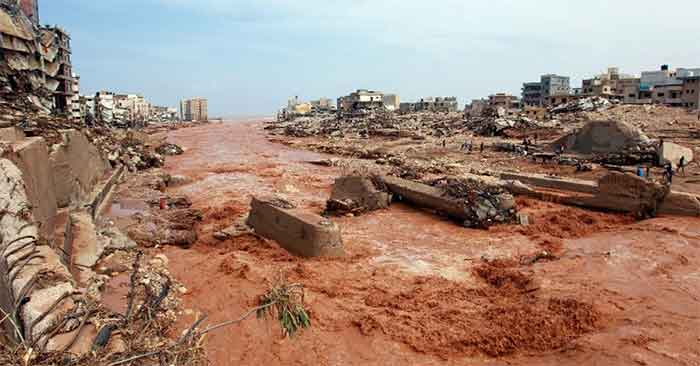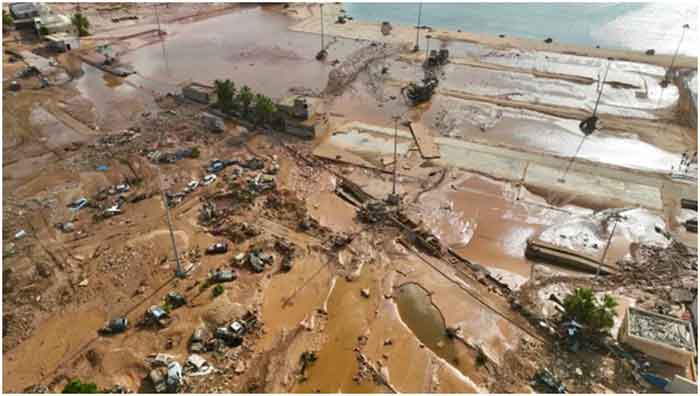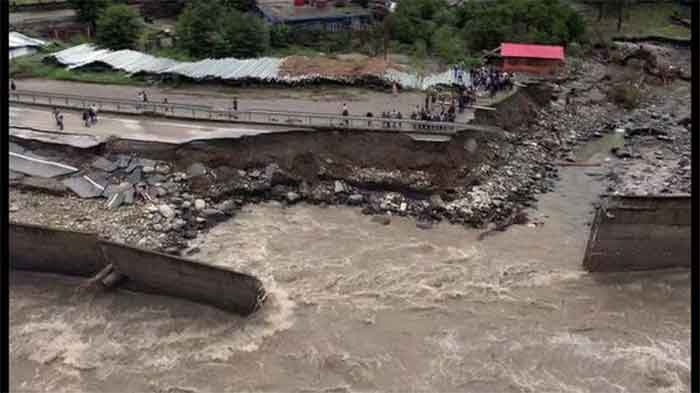
Following abnormally high damage caused by floods and landslides in Himachal Pradesh, the role of foreign aid in recovery effort is being discussed, particularly aid likely to be received from the World Bank.
A recent report by the Statesman News Service (The Statesman, July 29) has stated,
“The World Bank has assured assistance to disaster affected Himachal Pradesh and providing full support including a comprehensive assessment of the disaster. Chief Minister Sukhvinder Singh Sukhu expressed his gratitude to the World Bank for its generous support to the people of Himachal Pradesh in testing times.”
Further this report has quoted the Chief Minister Mr. Sukhu as saying, “The World Bank has offered to conduct an assessment in collaboration with the Global Facility for Disaster Reduction and Recovery (GFDRR) to quantify losses in various sectors such as roads, power, water supply, housing, public buildings, irrigation, horticulture, agriculture, livestock and ecological services.”
Vikas Vasudeva reported in The Hindu on July 30, “With torrential monsoon rains wreaking havoc in Himachal, the World Bank has praised the efforts of the Himachal Pradesh government and Sukhvinder Singh Sukhu’s leadership and offered help to the state.”
The letter written by the country director of the World Bank has been generous in its praise to the Chief Minister and has referred to the disaster as only ‘climate-related events’, thereby avoiding any reference to local failures which have been mentioned often elsewhere as one of the important contributory factors. On the other hand, the Chief Minister has been equally lavish in his praise for the perceived generosity of the World Bank, testifying to the very friendly chemistry between the two sides.
However this proposed assistance has to contend with two factors. Firstly, the general stand of the Indian government during the last two decades or so has been to avoid accepting foreign aid for disaster relief and recovery efforts, taking up this work on the basis of the country’s own resources. If the Indian government has been very reluctant generally on this score, then it is likely that this reluctance will be greater in the context of a more sensitive border state like Himachal Pradesh where handing over survey of damage in so many sectors would involve throwing up the entire information systems of the state and their contents to foreign aid and survey agencies.
Secondly, at a wider world level, there have been several concerns that there can be negative impacts of becoming dependent on foreign aid for disaster relief and recovery. Even a paper written for the GFDRR and the World Bank has expressed such concerns. In this paper (Policy Research Working Paper 4952) titled ‘Aid, Natural Disasters and the Samaritan’s Dilemma’, the authors Paul A. Raschky and Manijeh Schwindt have written, “Foreign aid received in the past might increase the predictability of ex-post relief and induce decision makers to shirk responsibility for reducing ex-ante protection activities. Such a reaction could result in higher financial losses and higher death tolls. For this reason, the disincentives induced by the large amount of relief are likely to further exacerbate the sustainable development of regions that are especially vulnerable to large-scale disasters.”
This paper is by no means against foreign aid for disasters, this merely mentions the possibilities of harm and mentions other relevant studies regarding this (just as it mentions also the possibilities of benefits).
In view of such controversies, it would be judicious to discuss various aspects more critically instead of jumping with joy as soon as offers of foreign aid are made.
One question that needs to be asked is whether the aid is being offered as a grant, or a loan. Ideally this should be a grant in the case of a disaster which is recognized by the donor as a climate induced disaster.
If it is offered as a loan, then this should be an interest –free loan. Another question that needs to be raised is whether any conditions are being attached to the loan (or the grant, whatever it is).
An important factor to recognize here is that the state already faces a burden of indebtedness and this should not be allowed to increase beyond a point.
If conditions attached to aid are likely to be adverse for desired priorities, then this will also be a problem.
In any case all the terms and conditions of any foreign aid package should be kept entirely transparent. These should be shared with the opposition parties, the panchayats and other local self-government units, various people’s organizations, civil society and the media. The final decision should be taken only after adequate discussion with the various stakeholders. This would be the proper democratic process.
One obvious question is—where is the need for the involvement of foreign agencies in conducting an assessment of the losses? This is a work which belongs to the state government, it is adequately and best equipped to carry out this assessment, it has in place the proper administrative machinery for this which is well-experienced in this work, much more than any foreign consultants unfamiliar with local conditions can be. The World Bank and the GFDRR, which are related, had recently conducted such an assessment survey in Syria following the earthquake there. Whatever may have been the situation there, certainly the administrative competence in Himachal is already there and in any case as per norms the state government will be making its assessment (is doing it as the situation evolves by the day), and the central government too is sending its teams to assess the damage. Then we have the local government institutions, media reporting on daily basis as well as our own experts who are there to advice the state government. We do not need the World Bank for such a survey.
This draws attention to some past experiences in which foreign aid agencies gave loans, then brought in their own very highly expensive consultants to use the loan for work which could have been done by the existing government staff. In the process indebtedness was incurred for tasks which did not really need any extra cash.
This is not at all to suggest that anything like this is involved in the present context, but one should learn from past experiences at least to be adequately cautious from the outset.
Also, as this is planned in the context of what was a climate-induced disaster in the perception of both donors and recipients, the Indian side should be extremely careful as the stand of India and developing counties differs in important respects from the stand of rich western countries (which have a dominating presence in the World Bank) on climate change response.
In fact a much better option than exploring foreign aid would be for the central government to go beyond its meager commitments so far and give a very generous grant to Himachal Pradesh, which is aimed at providing relief, rehabilitation, reconstruction and recovery, while also improving overall disaster response, ecological resilience and sustainable development prospects.
In fact this writer has been arguing for a long time that the central support for Himalayan states and particularly protection of their ecology should improve significantly keeping in view that this is so important not just for protecting the Himalayan people but also for protecting the much more densely populated vast plains below the mountains. Hence more central funds for Himachal Pradesh and other Himalayan states/union territories plus correcting the development priorities to make them more ecologically protective should be the most desirable step, instead of going in for foreign aid projects which may come with several problematic conditions.
Apart from this, in the specific context of Himachal Pradesh, more funds for relief and rehabilitation can be collected from the people, including Himachal people living in various parts of the country and world, and various civil society organizations should also be encouraged and provided enabling conditions to make their best possible contributions. Within various affected communities, those who have not suffered much should be encouraged to be as helpful as possible towards those who have suffered the most.
Bharat Dogra is Honorary Convener, Campaign to Save Earth Now. His recent books include ‘Planet in Peril’, ‘Man over Machine’, ‘A Day in 2071’ and ‘Hindi Cinema and Society’.

